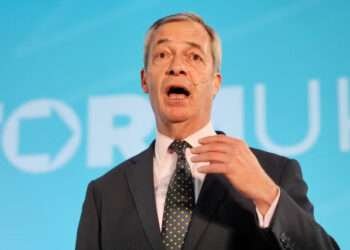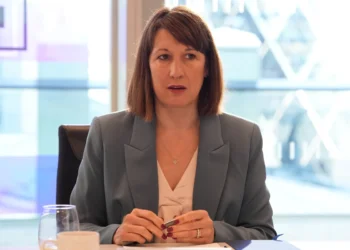The UK’s bid to reset its strained relationship with the European Union (EU) has hit a stumbling block, with former Europe minister Denis MacShane pointing fingers at the Home Office for delaying key concessions.
MacShane’s comments come as European affairs minister Nick Thomas-Symonds signals a potential opening for negotiations on a youth mobility scheme — a priority for Brussels and several EU member states.
Until recently, Prime Minister Keir Starmer’s government has resisted proposals for youth mobility, wary of crossing the manifesto’s “red lines,” which include prohibitions on any form of free movement of people.
The scheme, which would allow under-30s to travel and work freely between the UK and the EU, has emerged as a major point of contention.
Denis MacShane, who is currently in Brussels, expressed frustration over the lack of progress. “I fear Nick Thomas-Symonds sticking to an ultra-cautious line—up to EU to spell out what they want. They have on youth mobility. It’s the Home Office obstructing,” he wrote on X (formerly Twitter).

He likened the situation to previous government resistance under Tony Blair, when the Treasury hindered closer cooperation with the EU.
The youth mobility proposal has gained traction in Brussels, particularly in Germany and the European Commission, which view it as a key element of improved relations. However, MacShane’s remarks highlight internal UK challenges in advancing negotiations.
Three Pillars of Brexit Reset
Nick Thomas-Symonds, who is set to lead the UK’s Brexit reset talks in 2024, outlined the government’s three key objectives: a security and defence pact, reduced trade barriers, and enhanced policing cooperation. While the government aims to strike a balance, red lines remain firmly in place, including no return to free movement or rejoining the single market and customs union.
“It’s for the EU to finalise proposals it wants to put on the table. It depends on what precisely you mean by youth mobility,” Thomas-Symonds told the Lords’ European affairs committee. This cautious approach has drawn criticism for lacking ambition, particularly given the urgency of repairing the UK’s relationship with the EU.
Complicating matters is the looming possibility of Donald Trump’s return to the White House in January. His protectionist policies could impose tariffs on UK goods, forcing Britain to choose between prioritizing a trade deal with the US or forging closer ties with Europe.
The National Institute of Economic and Social Research has projected that such a trade policy could slash UK economic growth by half. Byrne painted a grim picture of the economic impact, stating, “If that does go ahead, that is going to have a really significant impact on growth, inflation, and interest rates in the UK.”
With Trump’s return to power raising the specter of an economic standoff, Lord Darroch, former US ambassador, expects the former president to “go big” on tariffs. He pointed out that securing a special deal for the UK might be unlikely, adding, “I think it will be quite a challenge for the UK.”
European leaders have expressed frustration with the UK’s hesitancy, urging more clarity and commitment from Starmer’s administration. The outcome of these talks could define the future of UK-EU relations for years to come.
READ ALSO: Ghana Records Impressive 7.2% Economic Growth in Q3 2024





















